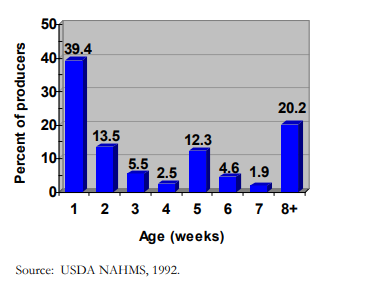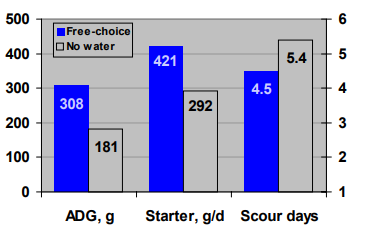Click here for a PDF version of this Calf Note
Introduction
Fresh, clean water is critical to successful rumen development. An important part of the calf’s development is the ability of the rumen to ferment the concentrate and forage that it eats. This is termed rumen development, and is necessary before the calf can be weaned successfully. Fermentation of feeds in the rumen produces volatile fatty acids (VFA). These acids cause dramatic changes in the size and activity of the rumen, and prepare the calf for weaning. Unless the calf consumes sufficient dry feed within the first few weeks of life, weaning will be delayed, or unsuccessful.
Rumen bacteria are responsible for fermentation of calf starter and grain to VFA in the rumen. To ferment substrate, these rumen bacteria must live in a water environment. Without sufficient water, bacteria cannot grow, and ruminal development is slowed. Here’s where this affects producers directly – most water that enters the rumen comes from free water intake. If water is offered to calves from an early age, this is not usually a problem; calves will drink enough water for the rumen bacteria and to quench their thirst. Unfortunately, many producers in the U.S. do not provide free water to their calves until calves reach 4 or more weeks of age (Figure 1).

Milk or milk replacer does not constitute “free water”. When milk or milk replacer is fed to calves, it bypasses the rumen and reticulum by the action of the esophageal groove. The esophageal groove is active in the calf until about 12 weeks of age. The groove closes in response to nervous stimulation, shunting milk past the reticulum and rumen and into the abomasum. Closure of the groove occurs whether calves are fed from buckets or bottles. Therefore, the feeding of milk replacer should not be construed as providing “enough water”. Calves need fresh, clean water from as early as 3 days of age.

Free water intake has been shown to increase body weight gain, starter intake, and reduce scours scores (Figure 2). When water was available, calves consumed more calf starter, grew faster, and scoured fewer days. Offering water is easy to do, simple, and can have immediate impact on your operation. If you’re not offering free water to your calves from 3 days of age, it’s time to do so.
References
1. Kertz, A. F., L. F. Reutzel, and J. H. Mahoney. 1984. Ad libitum water intake by neonatal calves and its relationship to calf starter intake, weight gain, feces score and season. J. Dairy Sci. 67:2964-2969.